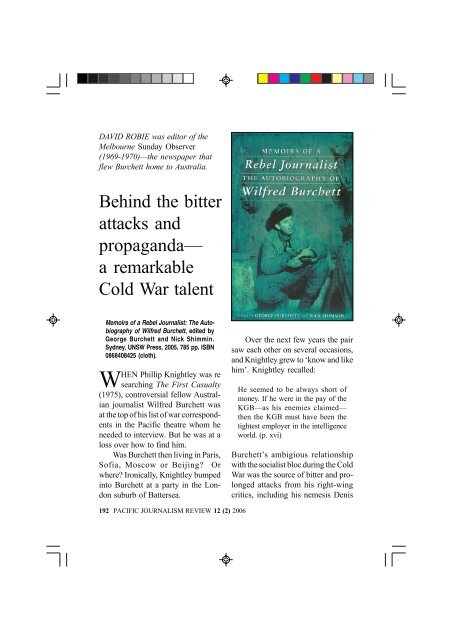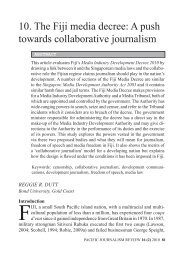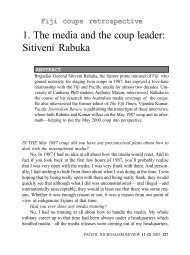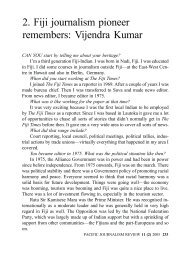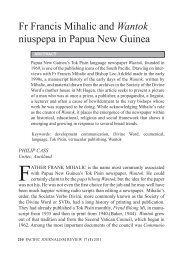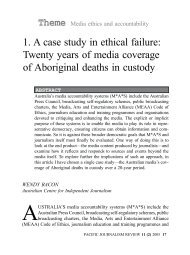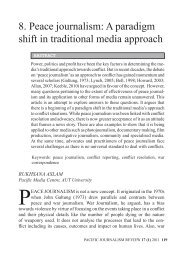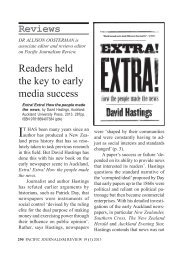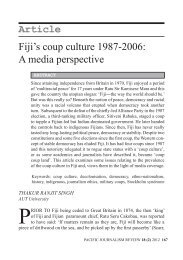Memoirs of a Rebel Journalist: The Autobiography of Wilfred Burchett
Memoirs of a Rebel Journalist: The Autobiography of Wilfred Burchett
Memoirs of a Rebel Journalist: The Autobiography of Wilfred Burchett
Create successful ePaper yourself
Turn your PDF publications into a flip-book with our unique Google optimized e-Paper software.
ECO-JOURNALISM AND SECURITY<br />
DAVID ROBIE was editor <strong>of</strong> the<br />
Melbourne Sunday Observer<br />
(1969-1970)—the newspaper that<br />
flew <strong>Burchett</strong> home to Australia.<br />
Behind the bitter<br />
attacks and<br />
propaganda—<br />
a remarkable<br />
Cold War talent<br />
<strong>Memoirs</strong> <strong>of</strong> a <strong>Rebel</strong> <strong>Journalist</strong>: <strong>The</strong> <strong>Autobiography</strong><br />
<strong>of</strong> <strong>Wilfred</strong> <strong>Burchett</strong>, edited by<br />
George <strong>Burchett</strong> and Nick Shimmin.<br />
Sydney, UNSW Press, 2005. 785 pp. ISBN<br />
0868408425 (cloth).<br />
WHEN Phillip Knightley was re<br />
searching <strong>The</strong> First Casualty<br />
(1975), controversial fellow Australian<br />
journalist <strong>Wilfred</strong> <strong>Burchett</strong> was<br />
at the top <strong>of</strong> his list <strong>of</strong> war correspondents<br />
in the Pacific theatre whom he<br />
needed to interview. But he was at a<br />
loss over how to find him.<br />
Was <strong>Burchett</strong> then living in Paris,<br />
S<strong>of</strong>ia, Moscow or Beijing? Or<br />
where? Ironically, Knightley bumped<br />
into <strong>Burchett</strong> at a party in the London<br />
suburb <strong>of</strong> Battersea.<br />
Over the next few years the pair<br />
saw each other on several occasions,<br />
and Knightley grew to ‘know and like<br />
him’. Knightley recalled:<br />
He seemed to be always short <strong>of</strong><br />
money. If he were in the pay <strong>of</strong> the<br />
KGB—as his enemies claimed—<br />
then the KGB must have been the<br />
tightest employer in the intelligence<br />
world. (p. xvi)<br />
<strong>Burchett</strong>’s ambigious relationship<br />
with the socialist bloc during the Cold<br />
War was the source <strong>of</strong> bitter and prolonged<br />
attacks from his right-wing<br />
critics, including his nemesis Denis<br />
192 PACIFIC JOURNALISM REVIEW 12 (2) 2006
Warner, <strong>of</strong> the now-closed Melbourne<br />
Herald, who was himself reputed to<br />
be linked to Australian intelligence<br />
services.<br />
Warner and other opponents <strong>of</strong><br />
<strong>Burchett</strong> constantly alleged he was a<br />
communist, KGB agent, alcoholic,<br />
womaniser, brainwasher and torturer.<br />
<strong>Burchett</strong> repeatedly denied these allegations,<br />
although he did write for<br />
communist newspapers such as<br />
l’Humanité (France) and the National<br />
Guardian (USA).<br />
<strong>The</strong>ir bitter struggle contributed<br />
to one <strong>of</strong> Australia’s most infamous<br />
libel trials in what many regard as<br />
‘kangaroo justice’ when a jury found<br />
<strong>Burchett</strong> had been defamed by exsenator<br />
John Kane but the attack on<br />
him had been a ‘fair’ representation<br />
<strong>of</strong> Senate proceedings. <strong>The</strong> Supreme<br />
Court <strong>of</strong> New South Wales ordered<br />
costs against <strong>Burchett</strong>—some<br />
$100,000, which ensured he would<br />
never again set foot in his homeland.<br />
In 1976, the federal Appeals<br />
Court ruled that <strong>Wilfred</strong> <strong>Burchett</strong> was<br />
<strong>of</strong> international repute, he had been<br />
seriously defamed and there was a<br />
miscarriage <strong>of</strong> justice, but a technicality<br />
prevented the judges calling for<br />
a new trial.<br />
For many people, myself included,<br />
<strong>Burchett</strong> was one <strong>of</strong> the finest<br />
journalists produced by Australia.<br />
But he was a victim <strong>of</strong> Cold War paranoia<br />
and the Machiavellian activities<br />
ECO-JOURNALISM AND SECURITY<br />
<strong>of</strong> Western bureaucrats and intelligence<br />
services.<br />
His international travels began in<br />
the South Pacific (see Pacific Treasure<br />
Island, 1941), but his first serious<br />
journalism began with dispatches<br />
from inside Nazi Germany about the<br />
strategic military significance <strong>of</strong> the<br />
autobahn and other pre-war developments.<br />
He also reported on the ‘Free<br />
French’ revolt against the Vichy regime<br />
in New Caledonia.<br />
After becoming a Fleet Street foreign<br />
correspondent, initially by airmail<br />
from Chungking,when covering<br />
the Burma Road lifeline to Chinese<br />
resistance against Japanese aggression<br />
in September 1941, his career<br />
was punctuated by many journalistic<br />
coups.<br />
<strong>Burchett</strong> reported from the jungles<br />
<strong>of</strong> Vietnam and Cambodia, interviewed<br />
and pr<strong>of</strong>iled Nehru in India,<br />
and wrote the first book about the<br />
first man in space, Yuri Gagarin. He<br />
provided a unique, insightful and independent<br />
perspective io the postcolonial<br />
struggles in the developing<br />
world—<strong>of</strong>ten conflicting with the<br />
‘facts’ peddled by the Australian and<br />
US governments (and other colonial<br />
administrations).<br />
While the Western press corps<br />
were witnessing the signing <strong>of</strong> the<br />
Japanese surrender in 1945, <strong>Burchett</strong><br />
slipped into Tokyo and headed for<br />
Hiroshima as the first foreign jour-<br />
PACIFIC JOURNALISM REVIEW 12 (2) 2006 193
ECO-JOURNALISM AND SECURITY<br />
nalist to report on the tragedy <strong>of</strong> that<br />
nuclear-bombed city. At that stage,<br />
four weeks after the US devastation,<br />
the true horror was still unknown in<br />
the West.<br />
This autobiography was the last<br />
<strong>of</strong> <strong>Burchett</strong>’s remarkable 31 books<br />
(but was incomplete when he died<br />
from cancer in 1983, aged 72). His<br />
titles including one co-authored with<br />
New Zealand Chinaphile Rewi Alley<br />
(1976). <strong>Memoirs</strong> records fascinating<br />
accounts <strong>of</strong> the realpolitik <strong>of</strong> the era<br />
as well as insights into <strong>Burchett</strong>’s own<br />
diverse life.<br />
His narrative about the 20-hour<br />
train ride to Hiroshima as a shimbun<br />
kisha (journalist)—the only European<br />
in a carriage full <strong>of</strong> Japanese troops—<br />
is evocative.<br />
<strong>The</strong> soldiers were very sullen at first,<br />
chattering away obviously about me<br />
in what seemed a hostile way. But<br />
they brightened up when I produced<br />
a pack <strong>of</strong> cigarettes …<br />
A major breakthrough came when I<br />
showed them the impressive scars on<br />
my leg, managing to get across to<br />
them that the wounds came from a<br />
Japanese plane in Burma and that I<br />
was a journalist. I had a battered<br />
Hermes typewriter with me as evidence.<br />
From then on it was smiles and<br />
friendship as the train bumped and<br />
thumped its way along, crawling at a<br />
snail’s pace over bombed bridges but<br />
hurtling down slopes at fearsome<br />
speed. <strong>The</strong> Japanese all had enormous<br />
bundles with them and I found<br />
later that they had just been demobilised<br />
and were allowed to take away<br />
from their barracks as much food and<br />
drink as they could carry—as well as<br />
their rifles wrapped up in blankets<br />
(p. 234)<br />
<strong>Burchett</strong> was unprepared for the<br />
scenes <strong>of</strong> devastation he faced in Hiroshima<br />
where some 100,000 people<br />
had died in in the bombing and the<br />
immediate aftermath: ‘If the evidence<br />
<strong>of</strong> the material destruction <strong>of</strong> the city<br />
had been horrifying, the effects on<br />
humans as I saw them inside the hospital<br />
wards was a thousand times<br />
more so’. <strong>The</strong> doctors had no idea <strong>of</strong><br />
what they were dealing with. In the<br />
first hospital ward that he visited,<br />
<strong>Burchett</strong> found a dozen or so people<br />
stretched out on mats in ‘various<br />
stages <strong>of</strong> mortal disintegration, from<br />
what I later learned to be atomic radiation’<br />
(p. 240).<br />
Amid the stench and images <strong>of</strong><br />
destruction, <strong>Burchett</strong> typed out the<br />
story that was splashed on the front<br />
page <strong>of</strong> the London Daily Express on<br />
6 September 1945:<br />
THE ATOMIC PLAGUE:<br />
‘I Write This As A Warning To <strong>The</strong><br />
World’<br />
DOCTORS FALL AS THEY WORK<br />
Poison gas fear: All wear masks<br />
(p. 241)<br />
194 PACIFIC JOURNALISM REVIEW 12 (2) 2006
This was the devastating experience<br />
that turned <strong>Burchett</strong> into a dissident<br />
journalist. <strong>The</strong> US government was<br />
so angered by the radiation sickness<br />
revelations that he was barred from<br />
Japan.<br />
As a journalist, I crossed paths<br />
with <strong>Burchett</strong> in Melbourne some 25<br />
years later, in 1970 while I was editor<br />
<strong>of</strong> the Sunday Observer (which<br />
became Nation Review). I hosted dinner<br />
for him at my terraced home in<br />
Carlton after my newspaper had hired<br />
a Piper Navajo to fly him from<br />
Noumea, New Caledonia, to his<br />
homeland. <strong>The</strong> mission defeated an<br />
Australian government vendetta that<br />
had kept him out <strong>of</strong> Australia for<br />
more than two decades. Prime Minister<br />
‘Pig Iron Bob’ Menzies had<br />
barred <strong>Burchett</strong> from returning home<br />
after his passport had been allegedly<br />
stolen by the CIA (see Passport,<br />
1969). <strong>The</strong> conservative Australian<br />
government under John Gorton had<br />
even refused to allow <strong>Burchett</strong> to visit<br />
his dying father in September 1969<br />
and then his dying brother Clive<br />
In an Observer editorial at the<br />
time, I wrote that the disgraceful and<br />
petty actions <strong>of</strong> the Australian government<br />
were reminiscent <strong>of</strong> a<br />
Kafkaesque novel, but sadly true:<br />
<strong>The</strong> government has clearly shamed<br />
Australia in this protracted and blatant<br />
example <strong>of</strong> victimisation…<br />
ECO-JOURNALISM AND SECURITY<br />
When <strong>Burchett</strong> finally arrives back<br />
in Australia our leaders should do all<br />
in their power to rectify a situation<br />
<strong>of</strong> their own making. For it has already<br />
made it a laughing stock in the<br />
eyes <strong>of</strong> the civilised world (<strong>The</strong> long<br />
road home, 1970).<br />
<strong>The</strong> Observer’s proprietor, Australia<br />
Party convenor and transport industry<br />
magnate Gordon Barton, funded<br />
the flight to Brisbane. <strong>Burchett</strong> was<br />
already well-established as the newspaper’s<br />
Southeast Asian correspondent,<br />
part <strong>of</strong> our campaign against the<br />
Vietnam War. And he later continued<br />
writing for Nation Review.<br />
<strong>The</strong> coeditors <strong>of</strong> <strong>Burchett</strong>’s autobiography,<br />
his second son George<br />
and Nick Shimmin, both subtitling<br />
editors at SBS TV, Australia’s<br />
multicultural broadcaster, have done<br />
an admirable job. <strong>The</strong>y have restored<br />
important material slashed by the cautious<br />
publishers from the ‘sanitised’<br />
earlier autobiography At the Barricades<br />
(1982). <strong>The</strong>y began work on<br />
the typescript, preserved by <strong>Wilfred</strong>’s<br />
widow Vessa in S<strong>of</strong>ia, Bulgaria, in<br />
2003. Notable among the restorations<br />
is a chapter titled ‘<strong>The</strong> bug <strong>of</strong>fensive’,<br />
a damning exposé about US biological<br />
warfare experiments during the<br />
Korean war.<br />
I found the concluding chapter<br />
‘Kangaroo justice’, about <strong>Wilfred</strong>’s<br />
sham court proceedings and media<br />
PACIFIC JOURNALISM REVIEW 12 (2) 2006 195
ECO-JOURNALISM AND SECURITY<br />
hysteria during his defamation action<br />
to clear his name, particularly revealing.<br />
In fact, it is rather ominous in the<br />
post-9/11 climate <strong>of</strong> paranoia with<br />
dissenting journalists again facing<br />
vilification and worse.<br />
As George notes in his preface,<br />
‘<strong>The</strong> real <strong>Wilfred</strong>, the man who broke<br />
the mould <strong>of</strong> sycophantic journalism,<br />
is found in the dynamic pages <strong>of</strong> this<br />
book’ (p. xi). Two boxes <strong>of</strong> documents<br />
released by Australian Security<br />
Intelligence Organisation (ASIO)<br />
and other government departments<br />
contain the vendetta fodder.<br />
References<br />
<strong>Burchett</strong>, W. (1982). At the Barricades:<br />
forty years on the cutting edge <strong>of</strong><br />
history.New York: Times Books.<br />
<strong>Burchett</strong>, W., with Alley R. (1976).<br />
China: the quality <strong>of</strong> life.<br />
Harmondsworth: Penguin.<br />
<strong>Burchett</strong>, W. (1969). Passport: an autobiography.<br />
London: Nelson.<br />
<strong>Burchett</strong>, W. (1941) Pacific Treasure Island—New<br />
Caledonia.London:<br />
McKay.<br />
Knightley, P. (1976). <strong>The</strong> first casualty:<br />
from the Crimea to Vietnam--the war<br />
corespondent as hero, propagandist<br />
and myth-maker. London: André<br />
Deutsche.<br />
<strong>The</strong> long road home (1970, February 22).<br />
Editorial, Melbourne Sunday Observer,<br />
p. 4. Melbourne Observer Souvenir:<br />
(Accessed 17 September 2006)<br />
www.melbourneobserver.com.au/<br />
observer35.pdf<br />
MONA PAPALI’I is an independent<br />
documentary film maker.<br />
Crucial Pasifika<br />
achievement<br />
in an era <strong>of</strong><br />
intense political<br />
conciousness<br />
Polynesian Panthers, edited by Melani<br />
Anae with Laut<strong>of</strong>a Iuli and Leilani<br />
Burgoyne. Auckland: Reed Books, 2006,<br />
144pp. ISBN-139780790010014<br />
IT WAS the early 1970s, they were<br />
just teenagers, and the first generation<br />
<strong>of</strong> Pacific Island migrants to be<br />
born in New Zealand. Home and<br />
church were the circles that kept culture<br />
alive, but outside its boundaries<br />
was a world many faced alone.<br />
This book is the story <strong>of</strong> the<br />
Polynesian Panther Party, a political<br />
group <strong>of</strong> inner city Pacific Island and<br />
Maori youth brought together through<br />
the shared experience <strong>of</strong> racism and,<br />
more importantly, the shared determination<br />
to fight it and the<br />
marginalisation in its wake.<br />
196 PACIFIC JOURNALISM REVIEW 12 (2) 2006


